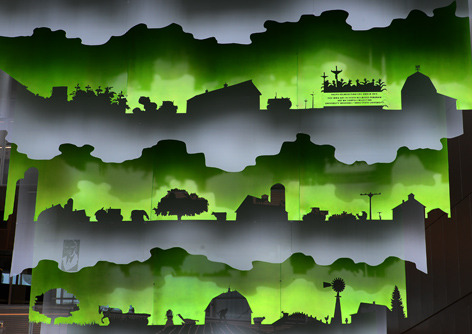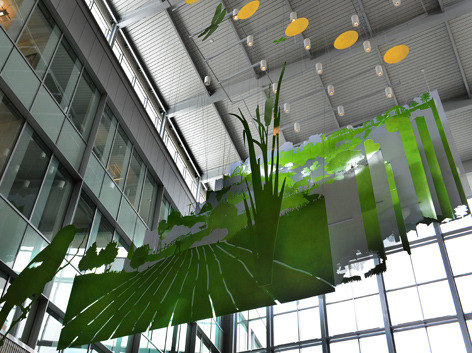History, suspended

View from the east of Ralph Helmick's Floating World.
The four-story foyer in the biorenewables complex was partially filled this month with a three-story suspended sculpture, Floating World, by artist Ralph Helmick of suburban Boston.
The edges of laser-cut steel panels, painted in alternating (and contrasting) green and lavender gray, depict agricultural progress in Iowa from the mid-19th century to the present. That history is visible twice, at the top of the panels when viewed from the west (below), and at the bottom edge of the panels when viewed from the east side of the foyer (above). An end panel in each view features a campus landscape of some of Iowa State's most notable buildings. The sculpture includes six golden circles, representing the sun -- agriculture's energy source – above the panels, and seven medallions embedded in the foyer floor that depict perspectives, from planetary to molecular.
Helmick said he was inspired by both Grant Wood paintings and Japanese woodblock prints from Edo-period Japan (1600-1860).
Floating World was commissioned under the Art in State Buildings program, which reserves one-half percent of a state building's construction budget for art. The sculpture joins University Museums' Art on Campus collection. Photos by Bob Elbert.

View from the west of Ralph Helmick's Floating World.
Stay on the right side of export control laws
In 2012, University of Tennessee professor John Reece Roth began serving a four-year jail sentence for export control violations. His crime: Using graduate students from China and Iran for U.S. Air Force research and carrying restricted data on his laptop during a trip to China.
The professor's incarceration illustrates how serious the consequences can be for academics who flout U.S. laws that are intended to keep certain technologies and information out of the hands of foreign nationals and nations.
While jail time for export control violations may be rare, tangling with the feds over export controls can be costly in other ways. Fines can run as high as $1 million per violation. Other consequences may include loss of funding or research privileges for an individual or even an entire institution.
ISU export control officer Brooke Langlitz said a little knowledge can go a long way in helping Iowa State faculty and staff avoid export control violations.
More about export controls
Contacts:
- Brooke Langlitz, 4-7793, langlitz@iastate.edu
- Matt House, 4-0269, housemat@iastate.edu
- export@iastate.edu
Sites, docs
Export control laws, designed mostly to serve national security or foreign policy purposes, are plentiful and complex. However, faculty and staff don't need to become experts, Langlitz said. They simply need to be able to identify red flags -- signs that their research or other work activities might be subject to export controls. Once they've flagged a potential issue, a quick call to Iowa State's export control office will get them in touch with the experts who can guide them through the paperwork and approval processes.
A one-page online document Is My Work at ISU Subject to Export Controls? provides a good overview of the kinds of university activities that may be subject to export control.
Here are a few of the red flags noted in the document:
You're shipping something abroad
Anytime you're shipping something to a foreign collaborator abroad or a foreign national in the United States, consider whether the items in the shipment might be subject to export control. In the Export Administration Regulations alone, there are thousands of controlled items grouped into several categories:
- nuclear
- materials, chemicals, microorganisms and toxins
- materials processing
- electronics
- computers
- telecommunication
- information security
- sensors and lasers
- navigation and avionics
- marine
- aerospace and propulsion
The export control office can help you determine, for example, if that electronic device or unpublished research data makes the list.
Shipments containing biological materials, including seeds, are common at Iowa State. International shipments of biological materials always require export control reviews, Langlitz said. Basically, a review involves scrutiny of the material itself, the person and the institution receiving it and, perhaps most importantly, its intended use.
"There are pathogenic bacteria that can be used for wonderful vaccines," Langlitz explained. "But bacteria could also be used for creating biological weapons."
Faculty and staff who aren't sure if their shipments are subject to export controls should contact the export control office as early as possible.
You're planning to take a laptop or GPS device out of the United States
Laptops and GPS devices are covered by export controls, in certain cases. Much depends on what's on the device and where you're taking it. Generally you can take your device abroad if:
- It doesn't have encryption software;
- It doesn't contain unpublished technical data; and
- You're not traveling to a U.S.-sanctioned country -- Cuba, Iran, North Korea, Sudan and Syria. Even if you're not going to one of these countries, it's a good idea to touch base with the export control office; sometimes you'll need to carry documentation for your device when you travel to other places.
Your sponsored research requires pre-approval prior to publication or places restrictions on foreign national participation
Whether your sponsor is John Deere, Boeing or the U.S. Department of Defense, export controls may apply if you're:
- Sending items or information outside the United States or to a foreign national in the United States
- Including international researchers or students in the research project
- Traveling abroad with your research data
It's wise to get ISU export control administrators involved in any of these situations. Restrictions will vary with the research, the sponsor and the foreign country involved.
Your work involves travel to, or collaboration with, citizens of these countries: Cuba, Iran, North Korea, Syria or Sudan
Because there are U.S. trade sanctions against these five countries, export control reviews are required for any research activities with them.
Export controls also are selectively applied to other countries as well. It all depends on the research and the reasons for the export control, Langlitz said. For example, an export control for high-level national security reasons might be applied for every country but Canada.
Stand Down for homeless veterans is July 29
Several Iowa State departments, Story County offices and the U.S. Department of Veterans Affairs will co-host the second annual Homeless Veterans Stand Down on Tuesday, July 29 (9 a.m.-3 p.m., Maple Shelter) at Ames' Brookside Park.
It's one of more than 200 Stand Down support initiatives held annually throughout the country, providing services including meals, clothing, dental and health screenings, haircuts, hygiene kits, sleeping bags, employment assistance and VA benefits counseling to those in need.
ISU Police detective Nick Grossman and Veterans Services coordinator Jathan Chicoine, both veterans, are among those leading the effort. They say there are some important things people should know about the Stand Down.
First, it's all free. The Stand Down will be staffed by volunteers and fueled by donations from local businesses and individuals. Second, it's open to anyone who is homeless or nearly homeless – you don't have to be a veteran to attend. And third, all participants have to do is show up in a safe, secure environment. Children are welcome, too.
"While this event is geared toward veterans, we will assist anyone who is homeless or at risk of being homeless, veteran or not. Sometimes all people need is a little help to get back on their feet," said Grossman, who also is ISU Police's military liaison officer.
Last year, about 50 people received services. Organizers say they hope to help even more community members this year.
"Homelessness (in Story County) is a bigger problem than the average citizen probably realizes," Grossman said. "There is a whole community of homeless living within Ames that most people don't see, at least not on a daily basis. If you don't really have a mailing address and live on someone's couch, for example, you're technically homeless, too."
Tuesday's Homeless Veterans Stand Down is possible through the support of the following departments and agencies:
- American Legion
- Ames Police
- Iowa State University: ISU Police, Veterans Center, Risk Management, Student Counseling Services, Dean of Students Office, ROTC
- Story County: Veterans Affairs, Emergency Management, Sheriff's Office
- U.S. Department of Veterans Affairs
- VFW
Greet Team PrISUm when race pauses in Ames on July 26
Iowa State's Team PrISUm will be one of about 10 university solar car teams passing through Ames July 26 as part of the biannual American Solar Challenge. Ames is the site of the required checkpoint that day, as teams and their solar-powered vehicles make their way from Omaha to La Crosse, Wisconsin, on Day 6 of the eight-day competition.
In conjunction with the race checkpoint, the College of Engineering is hosting a free public event from 1 to 4 p.m. in parking lot D-2 at the Iowa State Center. The event will feature demonstrations and hands-on activities for all ages by campus organizations, community clubs and companies. While waiting for team cars to arrive, visitors also can hang out with Cy or grab a bite to eat. Hy-Vee will be on site selling burgers, veggie burgers, brats, chips and drinks.
Solar cars, accompanied by team support vehicles, will arrive at the center and depart via U.S. Highway 30 and University Boulevard. According to race organizers, each team is at the checkpoint for about an hour before continuing on the race route. Visitors will have an opportunity to see the teams and their cars up close.
Checkpoint activities
Many of the exhibits follow a sustainability theme. For example, the North Central Iowa STEM Hub (ISU Extension and Outreach) will host KidWind Challenge, a hands-on and interactive wind energy activity. Visitors of all ages can design and construct wind turbine models and test them in a wind tunnel simulator. At other stations, learn how solar energy is captured and used. Other Iowa State student race teams will have their vehicles on display at the event.
